牛津英语模块四第二单元复习M4U2 Book 4 Unit 2
- 格式:ppt
- 大小:1.73 MB
- 文档页数:64
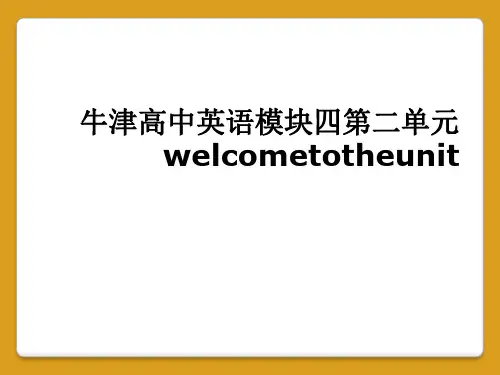
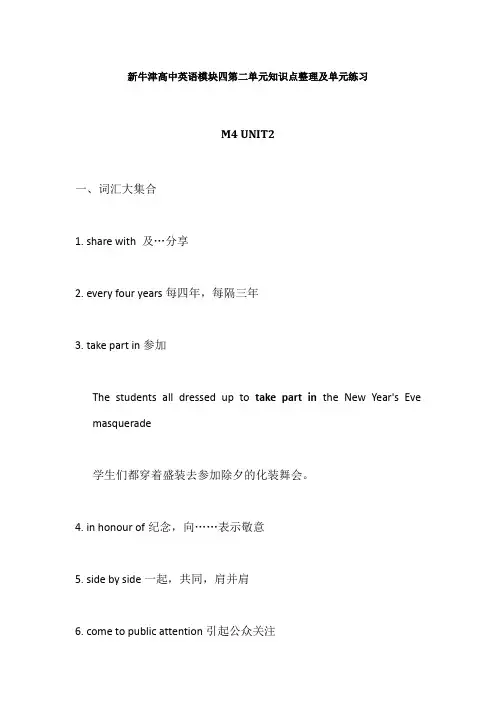
新牛津高中英语模块四第二单元知识点整理及单元练习M4 UNIT2一、词汇大集合1. share with 及…分享2. every four years每四年,每隔三年3. take part in参加The students all dressed up to take part in the New Year's Eve masquerade学生们都穿着盛装去参加除夕的化装舞会。
4. in honour of纪念,向……表示敬意5. side by side一起,共同,肩并肩6. come to public attention引起公众关注7. at the opening ceremony在开幕式上8. know of了解9. be recognized as被认为是10. play a role/part in在…起作用11. break a record打破纪录12. make contributions to作奉献13. set an example to树立典范14. look forward to15. come up with想出(方案、答复)16.plenty of许多,大量17.tourist attractions旅游景点,旅游胜地18. pay attention to注意19.be similar to 及……相似20.play leading roles in起主导作用21. meet one’s requirements满足需求22. daily routine日常工作,日常安排23. make way for给…让路24. hope for希望,期待25.maintain a balance保持平衡26.be involved in涉及27.add to增加28. keep…under control使…处于控制之下二、句型大集合1. I am delighted to have been invited to your school to talk to you about the history and significance of the Olympic Games.2. Today, athletes from around the world can take part, no matter what languages they speak.3. His dream was that the Olympic Games would make it possible for countries and people to live peacefully side by side.4. I am sure the whole of China must have felt proud when Xu Haifeng won the first gold medal for his country.5. Today, players from China, South Korea and Germany among others play leading roles in the international table tennis competition.6. Join me in wishing the Olympic movement a successful future to match its beautiful glorious past.7. I hope this information will be of use to you.8. I advise that you watch less TV at night.9. My advice to you is that you should drink more water.10. If I were you, I would certainly go to the football match instead of doing work at home.11. Will Thursday morning do I happen to be in town then.12. What/How about the high jump then13. In order for a new sport to be added , a current sport must be dropped.14. Supporters of wushu would like to see it entered as a branch in the Martial Arts category.15. The IOC is looking at revising the number and type of sports involved in the Olympics in the future, so wushu fans may finally get what they are hoping for.三、单元综合练习一、单项填空: 〔共15小题;每题1分,总分值15分〕1. Our team was defeated ________ a large score.A. byB. atC. inD. with2. Helen ______ go on the trip with us, but she isn’t quite sure yet.A. shallB. mustC. mayD. can3. —I usually go there by train.—Why not ________ by boat for a changeA. to try goingB. trying to goC. to try and goD. try going4. I would love ________ to the party last night but I had to work extra hours to finish a report.A. to goB. to have goneC. goingD. having gone5. We’ll ________ a trip to the mountain next week. Will you ________ usA. go to; join inB. go on; joinC. go on with; attendD. go in for; join6. This cake is very sweet. You __________ a lot of sugar in it.A. should putB. could have putC. might putD. must have put7. Tom , you leave all your clothes on the floor like this !A. wouldn’tB. mustn’tC. needn’tD. may not8. Two videophones stood ________ on the table.A. side by sideB. side to sideC. one by oneD. one side by the other side9. Beijing won the bid for the 2021 Olympic games, ________ delighted all the nation.A. whoB. whatC. whichD. that10. —How is Dennis getting along with his work— Well, he could always ________ a new idea for increasing sales.A. come up withB. come aboutC. get away withD. get up11. The doctor always ________ him not to smoke, but he didn't ________ it.A. suggested; takeB. advised; followC. demanded; listenD. warned; listen12. What he did suggested that he ________ little education.A. receiveB. receivedC. should receiveD. receives13. Will you please write the words ________ I mean you write them on the first line and then the third line and so on.A. every third lineB. every second linesC. every other linesD. every other line14. I didn’t see her in the meeting room this morning. She ___ have spoken at the meeting.A. mustn’tB. shouldn’tC. couldn'tD. needn’t15. --- I don't mind telling you what I know.--- You . I'm not asking you for it.A. mustn'tB. may notC. can'tD. needn二、完型填空〔共20小题;每题1分,总分值20分〕阅读下面短文,掌握其大意,然后从41—60各题所给的四个选项〔A、B、C和D〕中,选出最正确选项,并在答题卡上将该项涂黑。
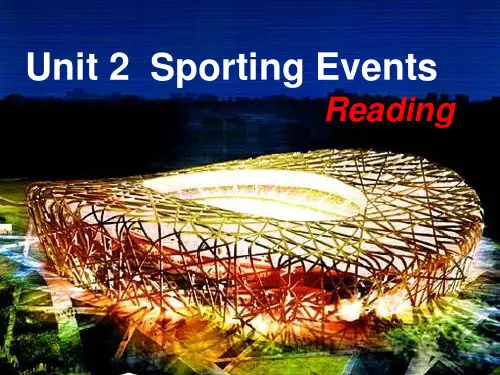
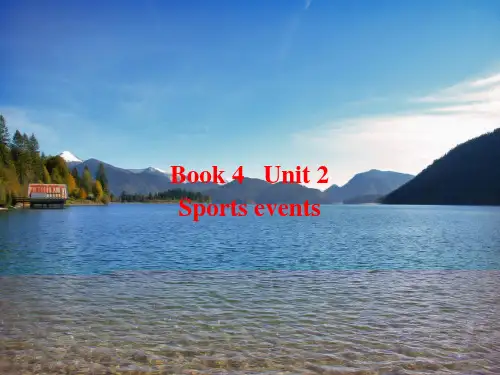
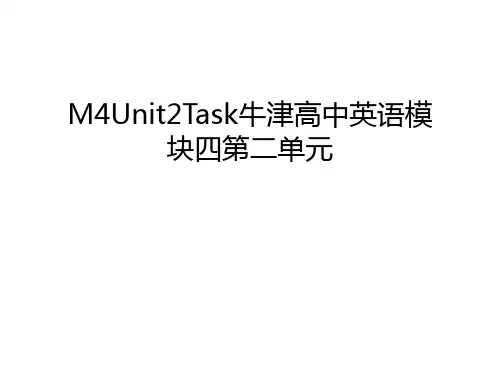
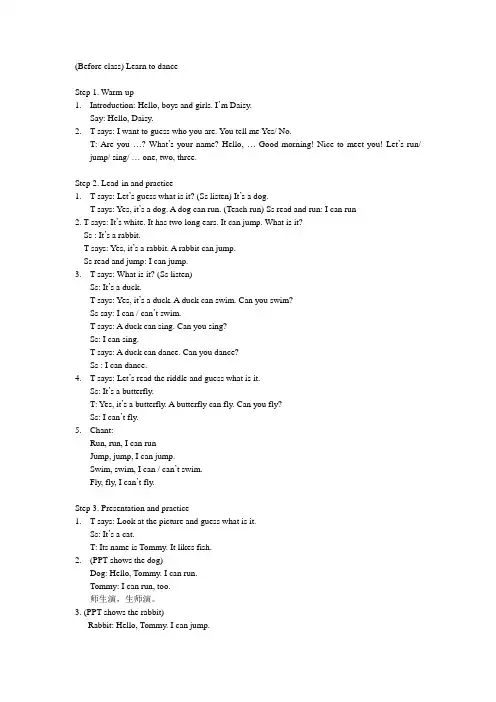
(Before class) Learn to danceStep 1. Warm-up1.Introduction: Hello, boys and girls. I’m Daisy.Say: Hello, Daisy.2.T says: I want to guess who you are. You tell me Yes/ No.T: Are you …? What’s your name? Hello, … Good morning! Nice to meet you! Let’s run/ jump/ sing/ … one, two, three.Step 2. Lead-in and practice1.T says: Let’s guess what is it? (Ss listen) It’s a dog.T says: Yes, it’s a dog. A dog can run. (Teach run) Ss read and run: I can run2. T says: It’s white. It has two long ears. It can jump. What is it?Ss : It’s a rabbit.T says: Yes, it’s a rabbit. A rabbit can jump.Ss read and jump: I can jump.3.T says: What is it? (Ss listen)Ss: It’s a duck.T says: Yes, it’s a duck. A duck can swim. Can you swim?Ss say: I can / can’t swim.T says: A duck can sing. Can you sing?Ss: I can sing.T says: A duck can dance. Can you dance?Ss : I can dance.4.T says: Let’s read the riddle and guess what is it.Ss: It’s a butterfly.T: Yes, it’s a butterfly. A butterfly can fly. Can you fly?Ss: I can’t fly.5.Chant:Run, run, I can runJump, jump, I can jump.Swim, swim, I can / can’t swim.Fly, fly, I can’t fly.Step 3. Presentation and practice1.T says: Look at the picture and guess what is it.Ss: It’s a cat.T: Its name is Tommy. It likes fish.2.(PPT shows the dog)Dog: Hello, Tommy. I can run.Tommy: I can run, too.师生演,生师演。
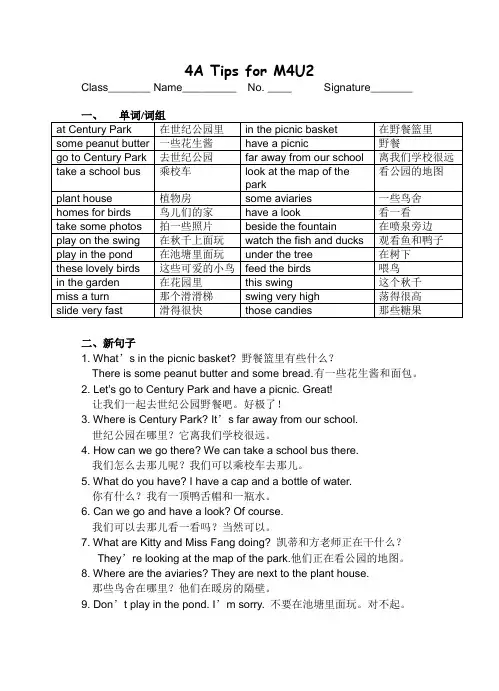
4A Tips for M4U2Class_______ Name_________ No. ____ Signature_______二、新句子1. What’s in the picnic basket? 野餐篮里有些什么?There is some peanut butter and some bread.有一些花生酱和面包。
2. Let’s go to Century Park and have a picnic. Great!让我们一起去世纪公园野餐吧。
好极了!3. Where is Century Park? It’s far away from our school.世纪公园在哪里?它离我们学校很远。
4. How can we go there? We can take a school bus there.我们怎么去那儿呢?我们可以乘校车去那儿。
5. What do you have? I have a cap and a bottle of water.你有什么?我有一顶鸭舌帽和一瓶水。
6. Can we go and have a look? Of course.我们可以去那儿看一看吗?当然可以。
7. What are Kitty and Miss Fang doing? 凯蒂和方老师正在干什么?They’re looking at the map of the park.他们正在看公园的地图。
8. Where are the aviaries? They are next to the plant house.那些鸟舍在哪里?他们在暖房的隔壁。
9. Don’t play in the pond. I’m sorry. 不要在池塘里面玩。
对不起。
10. What do they like? They like this swing.他们喜欢什么?他们喜欢这个秋千。
三. 语法知识:本周复习了表示方位的介词:1.at表示"在.处",一般指较小的比较具体的地点.如:He isn't at school. He is at home.他不在学校,他在家.2.in表示"在...内部;在...里面"的意思.如:What is in the box?盒子里有什么?3.on表示"在某物的上面",但两者互相接触.如:My books are on that table.我的书在那张桌子上.4.under表示"在某物垂直的正下方",两者之间不接触.如:My cat is under my chair.我的猫在我的椅子下.5.behind表示"在某物体的后面","在...之后".如:The broom is behind the door.笤帚在门后.There is another fruit tree behind the house.房后还有一棵果树. 6.in front of表示"在...的前面",正好与behind相反.如:There are some big trees in front of our classroom.我们教室前面有几棵大树.There is a fruit tree in front of the house.房子前面有一棵果树.7.near/beside表示"在某物体的附近",意为\"接近、靠近\".如:The ball is near the door.球在门旁边.8. next to表示“紧挨着,紧邻着”The book shop is next to the toy shop. 这家书店在玩具店的旁边。
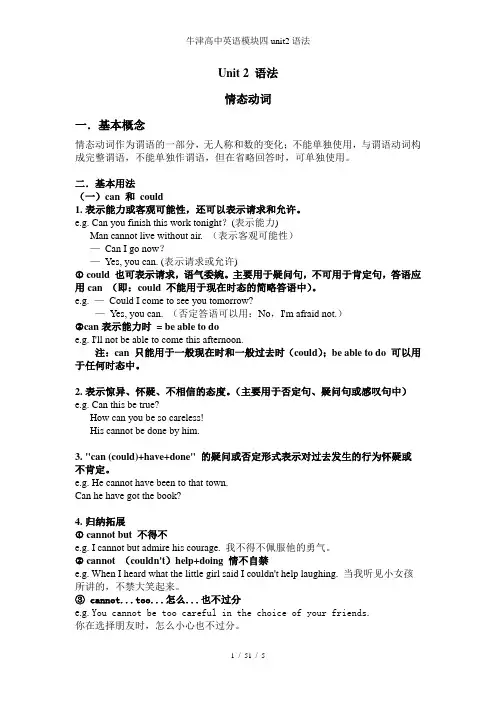
Unit 2 语法情态动词一.基本概念情态动词作为谓语的一部分,无人称和数的变化;不能单独使用,与谓语动词构成完整谓语,不能单独作谓语,但在省略回答时,可单独使用。
二.基本用法(一)can 和could1.表示能力或客观可能性,还可以表示请求和允许。
e.g. Can you finish this work tonight?(表示能力)Man cannot live without air. (表示客观可能性)—Can I go now?—Yes, you can. (表示请求或允许)① could 也可表示请求,语气委婉。
主要用于疑问句,不可用于肯定句,答语应用can (即:could 不能用于现在时态的简略答语中)。
e.g. —Could I come to see you tomorrow?—Yes, you can. (否定答语可以用:No,I'm afraid not.)②can表示能力时= be able to doe.g. I'll not be able to come this afternoon.注:can 只能用于一般现在时和一般过去时(could);be able to do 可以用于任何时态中。
2.表示惊异、怀疑、不相信的态度。
(主要用于否定句、疑问句或感叹句中)e.g. Can this be true?How can you be so careless!His cannot be done by him.3."can (could)+have+done" 的疑问或否定形式表示对过去发生的行为怀疑或不肯定。
e.g. He cannot have been to that town.Can he have got the book?4.归纳拓展① cannot but 不得不e.g. I cannot but admire his courage. 我不得不佩服他的勇气。
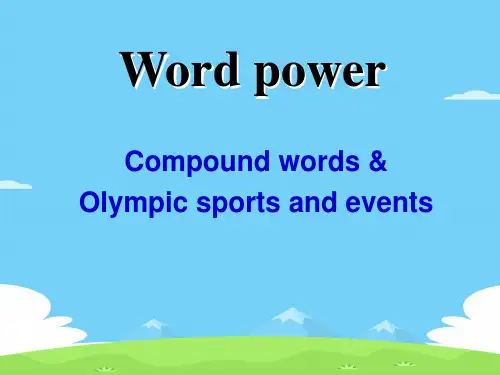
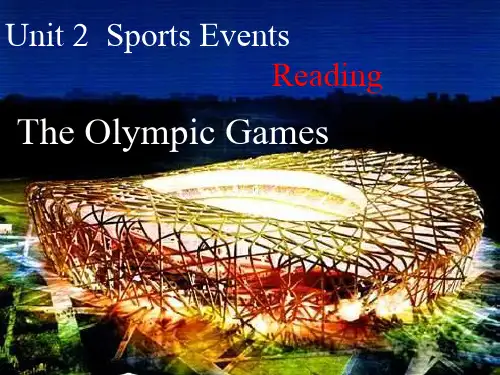

Module 4 Unit 2知识点补充一、重点单词及短语1.the International Olympic Committee 国际奥委会2.be delighted to高兴地做某事,对某事感到高兴3・share sth・with sb.・和.分享....4.every four years 每四年一次5.by tradition 按照传统6.at a separate festival在一个单独的节日中7.of all time有史以来,一直以来的e to public attention 引起公众瞩目9.light the Olympic flame 点燃奥运圣火light v.点燃,点亮lit(pt) lit(pp)10.at the opening ceremony 在开幕仪式上11.make important contributions to 对... 做出重要贡献12.after 32 years' absence 阔别三十二年后absence n.缺席absent adj.缺席的13.for the first time 第一次 ...14.with their attempts to用他们对.... 的尝试attempt to尝试做某事15.look forward to doing 期望做.....16.match its past glory=match its glorious past 与辉煌的过去相辉映,相匹配17.lift sb./sth. up 把.... 举起18.attend the lecture 出席讲座be absent for the lecture 缺席讲座19.receive your letter=hear from you 收到你的来信20.protect sb. from/against possible dangers 保护你免受潜在危险的伤害21.follow one's advice/tips/suggestions/recommendations 听从..... 的建议22.host the Olympics主办奥运会host v.主持,款待n.东道主,主持人hostess女主人23.provide first-class training grounds 提供一流的训练场地class n.阶级,等级24.get dressed穿好衣服,梳妆完毕25.keep fit保持健康fit adj.舒适的,合适的,健壮的(ant.) unfit不舒服的,不合适的26.have your teeth checked 检查你的牙齿have sth. done 让..... 被 ...27.at least至少at most之多,充其量28.plenty of grain products大量的谷物制品grain n.谷物,粮食29.four times a day 一天四次30.for a while 有一段时间31.2.74metres by 1.525metres 长2.74 米宽1.525 米32.be 15.25centimetres high 高15.25 厘米33.be similar to 和.... 相似be familiar with 和 ..... 相熟34.the exact origin 确切的起源35.go outdoors去户夕卜outdooradj.户外的,野外的outdoors adv.在户夕卜n.户外36.be popular with在.... 中流行,受... 欢迎37.stare at盯着 ... 看,凝视... glance瞥一眼glare怒视38.play leading roles in在 ... 中扮演领导角色,在..... 发挥主导作用39.be of use to sb.对... 有用二be useful to sb.40.be shaped like 形似...41.during the Middle Ages 在中世纪42.enter the Olympics 进入奥运会43.international association 国际协会44.keep budget under control使预算保持在控制之中45.make way for 为.... 让路46.apply to get into the Olympics 申请进入奥运会apply for为 ... 而中请apply to sb.向..... 提出申请apply to sth.适用于47.be connected with 和 ... 有关联concerning prep.关于48.blow the whistle 吹响哨声blow v.吹,爆炸pt. blew pp. blown49.keep a close watch on密切注视,密切监视50.by a score of 5 to 1以五比一的分数51.with minutes to go 还剩儿分钟二with minutes left52.by accident 偶然地,不经意地二by chance=accidental53.in honor of二in memory of 为纪念 ..54.update sb. on sth.向... 提供.... 的最新消息55.meanwhile 同时afterwards 然后otherwise 否则56.frequent adj 频繁的frequently adv.频繁地frequency n.频率二、重点句型及优美语句l.lt was a Frenchman, Pierre de Coubertin, who brought the Olmpics back to life. 是一个法国人,顾拜旦,让奥利兀克运动会重获新生。